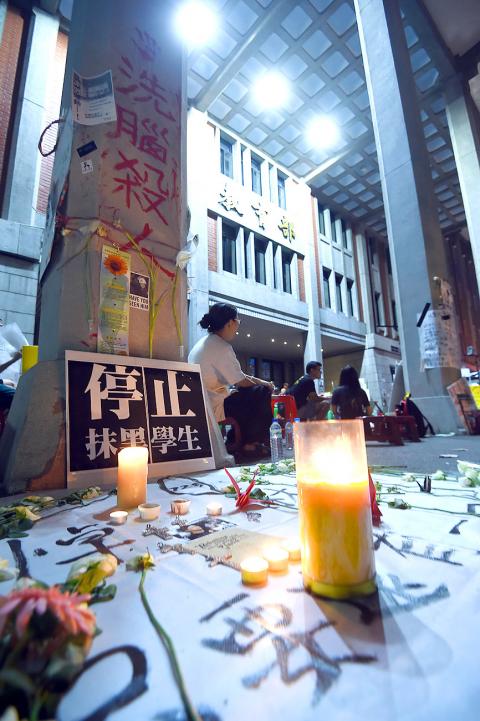Nearly 60 percent of Taiwanese disapprove of students’ rallies and the encirclement of the Ministry of Education compound to express their opposition to a series of revisions to the history curriculum guidelines for senior-high schools, according to the results of a survey commissioned by the Chinese Nationalist Party (KMT) released yesterday
The survey, conducted by Trend Survey and Research on Aug. 1 and Aug. 2, showed that 58.9 percent of respondents said they disapproved of the methods used by the students to express their objections to the revised textbook guidelines, while 36.2 percent said they supported the students’ actions.
Asked if they supported surrounding the compound to demand the resignation of Minister of Education Wu Se-hwa (吳思華), 58.4 percent of respondents replied “No,” while 32.3 percent said “Yes.”

Photo: Fang Pin-chao, Taipei Times
Students have taken to the streets in recent weeks to oppose changes to high-school history curriculum guidelines, which, according to the demonstrators, “are presented from the perspective of Chinese unification.”
The rallies saw student activists climb over a police barrier late on Friday last week into the forecourt of the ministry building, from where they have been confronting police ever since.
The protesters are demanding the withdrawal of the revised curriculum guidelines and the minister of eductaion’s resignation.
In a news conference at the Legislative Yuan after the publication of the survey results, KMT caucus secretary-general Lin Te-fu (林德福) said that the poll was conducted to reveal what “normal people” think about the protesting students’ behavior.
Other social opinions can be observed through the poll, Lin said, adding that “the survey data shows that 57.4 percent [of respondents] think political force should not be used to push students to the front line.”
KMT Legislator Alicia Wang (王育敏) said that many school teachers and principals have agreed that the old and new curriculum guidelines should be adopted at the same time.
She said that true education should present different points of view, allowing students to know that history is not something any particular party can determine.
“If we admit that in Taiwanese society the Republic of China perspective of history and the Taiwanese perspective of history now coexist, subsequent generations should have the right to know both of them,” Wang said.
The survey was conducted among people aged 20 and over in 22 counties and cities nationwide. A total of 800 valid samples were collected. The margin of error was plus or minus 3.5 percentage points.
In response, Democratic Progressive Party (DPP) Legislator Chen Ting-fei (陳亭妃) said the that survey does nothing but raise the tensions between the protesters and the government.
The DPP has also conducted a survey on the issue, the results of which are totally opposite to those of the KMT poll, she said.
According to a survey conducted by the DPP and released on Thursday last week, as many as 72.1 percent of respondents said that implementation of the ministry’s new high-school curriculum guidelines should be postponed, while more than 60 percent think it is inappropriate for the ministry to prosecute the students who stormed the ministry’s compound on Thursday last week.

Chinese Nationalist Party (KMT) Chairman Eric Chu (朱立倫), spokeswoman Yang Chih-yu (楊智伃) and Legislator Hsieh Lung-chieh (謝龍介) would be summoned by police for questioning for leading an illegal assembly on Thursday evening last week, Minister of the Interior Liu Shyh-fang (劉世芳) said today. The three KMT officials led an assembly outside the Taipei City Prosecutors’ Office, a restricted area where public assembly is not allowed, protesting the questioning of several KMT staff and searches of KMT headquarters and offices in a recall petition forgery case. Chu, Yang and Hsieh are all suspected of contravening the Assembly and Parade Act (集會遊行法) by holding

PRAISE: Japanese visitor Takashi Kubota said the Taiwanese temple architecture images showcased in the AI Art Gallery were the most impressive displays he saw Taiwan does not have an official pavilion at the World Expo in Osaka, Japan, because of its diplomatic predicament, but the government-backed Tech World pavilion is drawing interest with its unique recreations of works by Taiwanese artists. The pavilion features an artificial intelligence (AI)-based art gallery showcasing works of famous Taiwanese artists from the Japanese colonial period using innovative technologies. Among its main simulated displays are Eastern gouache paintings by Chen Chin (陳進), Lin Yu-shan (林玉山) and Kuo Hsueh-hu (郭雪湖), who were the three young Taiwanese painters selected for the East Asian Painting exhibition in 1927. Gouache is a water-based

Taiwan would welcome the return of Honduras as a diplomatic ally if its next president decides to make such a move, Minister of Foreign Affairs Lin Chia-lung (林佳龍) said yesterday. “Of course, we would welcome Honduras if they want to restore diplomatic ties with Taiwan after their elections,” Lin said at a meeting of the legislature’s Foreign Affairs and National Defense Committee, when asked to comment on statements made by two of the three Honduran presidential candidates during the presidential campaign in the Central American country. Taiwan is paying close attention to the region as a whole in the wake of a

OFF-TARGET: More than 30,000 participants were expected to take part in the Games next month, but only 6,550 foreign and 19,400 Taiwanese athletes have registered Taipei city councilors yesterday blasted the organizers of next month’s World Masters Games over sudden timetable and venue changes, which they said have caused thousands of participants to back out of the international sporting event, among other organizational issues. They also cited visa delays and political interference by China as reasons many foreign athletes are requesting refunds for the event, to be held from May 17 to 30. Jointly organized by the Taipei and New Taipei City governments, the games have been rocked by numerous controversies since preparations began in 2020. Taipei City Councilor Lin Yen-feng (林延鳳) said yesterday that new measures by